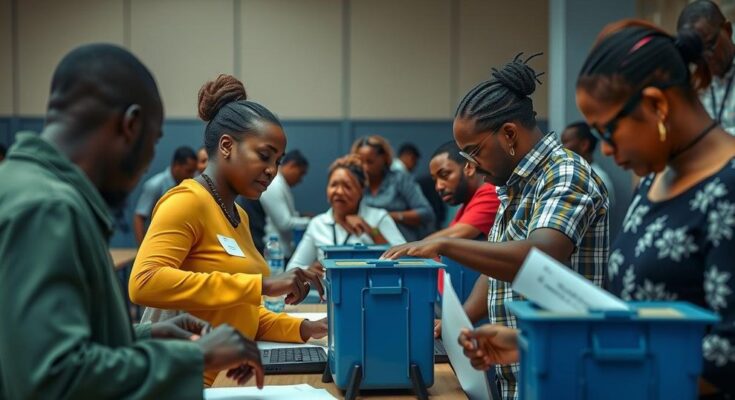Gabon is voting on a new constitution aimed at establishing presidential term limits and preventing dynastic succession following last year’s military coup that ousted President Ali Bongo Ondimba. Approximately 860,000 registered voters are participating in this crucial referendum, which General Brice Oligui Nguema, the transitional leader, touts as a historic moment. The results will dictate the country’s path towards democracy after decades of Bongo family rule.
Gabon is currently engaged in a pivotal referendum concerning the adoption of a new constitution, a move anticipated to facilitate a return to democratic governance following the military coup that ousted President Ali Bongo Ondimba last year. With approximately 860,000 registered voters, the proposed charter seeks to implement significant reforms, including imposing presidential term limits and thwarting dynastic succession in leadership roles, thus signaling an end to the Bongo family’s 55-year legacy in power.
General Brice Oligui Nguema, the transitional leader and orchestrator of the coup, has actively encouraged the populace to endorse the new constitution. In his assertion, he views this vote as a historical milestone for Gabon. Nguema, having pledged to return governance to civilian hands after a two-year transitional period, remains keenly interested in the upcoming presidential election scheduled for August 2025, openly aspiring for victory in that contest.
This referendum represents a critical initial stride for Gabon after President Bongo’s overthrow in August 2023. The new constitutional framework introduces a seven-year term for the presidency, a limitation on terms to two, and eliminates the prime ministerial position. Additionally, it explicitly states that relatives of the president are prohibited from succeeding their family members in office.
Amidst a mix of support and skepticism, voter sentiments have emerged with varying degrees of enthusiasm. Civil servant Nathalie Badzoko expressed her support, albeit acknowledging a limited understanding of the charter’s comprehensive provisions. Conversely, critics contend that the constitution is engineered to fortify a potential dictatorship, illustrating a deep-seated concern over the concentration of power in the hands of the military government.
As polling commenced in Libreville, with all 2,835 stations operating until 6 PM, the expectation remains that the military-backed draft charter will secure the requisite majority for adoption. Ultimately, the results of this referendum will be conveyed by the constitutional court, marking a crucial phase in Gabon’s political evolution and efforts towards democratization.
The political landscape of Gabon has historically been shaped by familial leadership, epitomized by the Bongo dynasty, which has governed the nation since its independence from France in 1960. The recent military coup that ended President Ali Bongo Ondimba’s rule marked a significant shift, as the president was deposed after initial claims of electoral victory were deemed fraudulent. As Gabon aspires towards democratic reform, the proposed constitution serves as a potential framework for systemic change, addressing concerns over leadership succession and governance integrity.
In conclusion, the referendum on Gabon’s new constitution is a significant and strategic development in the nation’s quest for democracy. With proposed reforms aiming to establish presidential term limits and to eliminate familial succession, the outcome of this vote will be instrumental in shaping Gabon’s political future. As the transitional leadership seeks to legitimize its authority through constitutional change, the populace’s participation and perspectives will prove essential in steering the nation towards a more democratic framework.
Original Source: www.aljazeera.com




